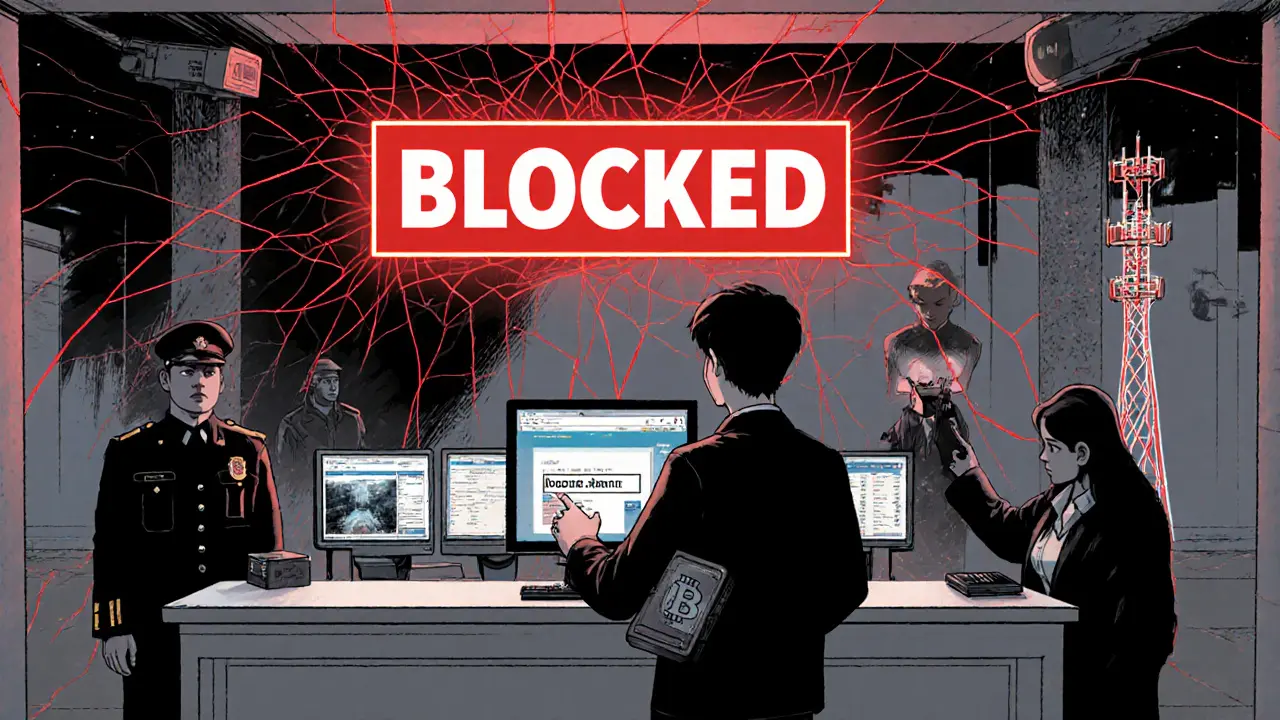- Home
- Cryptocurrency
- China’s Crypto Ban Explained: What Bitcoin Holders Need to Know

China’s Crypto Ban Explained: What Bitcoin Holders Need to Know
China's Crypto Ban Timeline & Impact Calculator
Key Ban Details
Under China's crypto ban, all crypto-related activities are illegal within mainland China. This includes exchanges, mining, and financial services involving digital assets.
Impact Assessment
This tool helps you understand how the ban affects your Bitcoin holdings based on your location and activity level.
Timeline of China's Crypto Ban Evolution
Activities Prohibited Under the Ban
| Activity | Legal Status | Enforcement Mechanism |
|---|---|---|
| Operating a cryptocurrency exchange | Illegal | Administrative penalties; shutdown orders |
| Providing crypto-related financial services (e.g., custodial accounts) | Illegal | Banking regulator audits; fines |
| Mining Bitcoin or other proof-of-work coins | Prohibited | Site inspections; power-grid bans |
| Facilitating overseas exchange access for Chinese residents | Banned | ISP blocking; reporting requirements |
| Advertising or sharing crypto-related content online | Forbidden | Content takedown requests; fines for platforms |
Potential Risks for Bitcoin Holders
Bank-Level Blocking
Domestic banks must flag and reject any transaction referencing a crypto wallet address. Attempting to cash out through a Chinese bank can trigger frozen accounts or legal scrutiny.
AML Scrutiny
The Ministry of Public Security treats virtual currencies as high-risk money-laundering channels. Financial institutions must run real-time monitoring systems that can freeze funds tied to crypto activity.
Cross-border Access
While offshore exchanges accept Chinese users, ISPs are ordered to block URLs facilitating registration. VPNs work but attract additional surveillance.
Risk Assessment Calculator
Risk Assessment Result:
Recommended Actions
- Move Assets to Secure, Non-Chinese Custody: Transfer your Bitcoin to a hardware wallet you control or to a reputable overseas exchange that complies with KYC.
- Use Peer-to-Peer (P2P) Channels Carefully: Platforms that match buyers and sellers can bypass formal exchanges, but they still require verification.
- Stay Informed About Enforcement Waves: Subscribe to reputable crypto-news outlets that track Chinese policy moves.
- Consider Tax Implications: Consult a tax advisor familiar with both Chinese law and offshore crypto taxation.
- Plan for a Potential CBDC Landscape: The digital yuan (e-CNY) will be tightly monitored and linked to your real-name ID.
When China’s crypto ban was tightened to close every legal doorway for digital‑asset businesses, Bitcoin owners suddenly found themselves in a regulatory maze that stretches far beyond the Great Wall. If you hold, trade, or mine Bitcoin and have any ties to China-whether you’re a citizen, a resident, or just have family there-understanding what’s really happening is crucial. This guide walks you through the ban’s history, what it means for your Bitcoin, and how to protect yourself in a market that still feels the aftershocks of Beijing’s crackdown.
Key Takeaways
- All crypto‑related services, including exchanges, derivatives and ICOs, are illegal in mainland China.
- Mining is effectively shut down; the few remnants operate in legal gray zones.
- Banking and payment firms must flag and block any Bitcoin‑related transactions.
- Chinese residents can still access overseas platforms, but enforcement is uneven.
- Future policy may shift toward a tightly‑controlled, KYC‑heavy licensing model, not full legalization.
How the Ban Evolved - A Quick Timeline
- 2013: The People’s Bank of China (PBOC) labels Bitcoin a “virtual commodity” and bans financial institutions from dealing with it.
- 2017 (Sept): Chinese regulators outlaw ICOs and force domestic exchanges to shut down or move offshore.
- 2021 (May 21): The State Council’s Financial Stability and Development Committee orders a crackdown on Bitcoin mining and trading, citing systemic risk.
- 2024: A notice from the People’s Bank of China reiterates that cryptocurrencies are not legal tender and bans issuance or exchange of tokens.
- 2025: Rumors of an even stricter ban surface, later debunked as fake news, but they underscore the market’s sensitivity to Beijing’s stance.
What the Ban Actually Prohibits
| Activity | Legal Status | Enforcement Mechanism |
|---|---|---|
| Operating a cryptocurrency exchange | Illegal | Administrative penalties; shutdown orders |
| Providing crypto‑related financial services (e.g., custodial accounts) | Illegal | Banking regulator audits; fines |
| Mining Bitcoin or other proof‑of‑work coins | Prohibited (energy‑intensive activity) | Site inspections; power‑grid bans |
| Facilitating overseas exchange access for Chinese residents | Banned | Internet service provider blocking; ISP reporting |
| Advertising or sharing crypto‑related content online | Forbidden | Content takedown requests; fines for platforms |

Why Bitcoin Holders Should Care
Even if you never plan to trade on a Chinese exchange, the ban creates three concrete risks for anyone with Bitcoin exposure linked to China.
- Bank‑level Blocking: Domestic banks are mandated to flag and reject any transaction that references a crypto wallet address. Attempting to cash out through a Chinese bank can trigger frozen accounts or legal scrutiny.
- AML Scrutiny: The Ministry of Public Security (MPS) treats virtual currencies as high‑risk money‑laundering channels. Financial institutions must run a real‑time monitoring system that can freeze funds if they appear tied to crypto activity.
- Cross‑border Access: While offshore exchanges technically accept Chinese users, internet‑service providers are ordered to block URLs that facilitate registration. VPNs work, but they attract additional surveillance.
Practical Steps for Bitcoin Holders
- Move Assets to Secure, Non‑Chinese Custody: Transfer your Bitcoin to a hardware wallet you control or to a reputable overseas exchange that complies with KYC.
- Prefer cold storage if you don’t need regular trading.
- Test a small amount first to verify the receiving address works under China’s internet controls.
- Use Peer‑to‑Peer (P2P) Channels Carefully: Platforms that match buyers and sellers can bypass formal exchanges, but they still require you to verify the counterpart’s compliance with local regulations.
- Insist on escrow services that don’t involve Chinese banks.
- Avoid sharing wallet addresses publicly; use off‑the‑record messaging.
- Stay Informed About Enforcement Waves: The country periodically launches “clean‑up” campaigns. Subscribe to reputable crypto‑news outlets that track Chinese policy moves.
- Watch for announcements from the State Council or the National Development and Reform Commission.
- Consider Tax Implications: Even if China doesn’t recognize crypto as legal tender, capital‑gain taxes may still apply if you are a tax resident.
- Consult a tax advisor familiar with both Chinese law and offshore crypto taxation.
- Plan for a Potential CBDCLandscape: The People’s Bank of China is rolling out its digital yuan (e‑CNY). If you ever need to interact with the official digital currency, know that it will be tightly monitored and linked to your real‑name ID.
Global Ripple Effects
The Chinese market once accounted for roughly 30% of global Bitcoin mining hash rate. When the government shut down factories, the hash power migrated to North America, Kazakhstan and Iran, reshaping the decentralization map. For investors worldwide, the ban means two things:
- Supply Shock‑Mitigation: Reduced domestic mining can tighten Bitcoin’s supply curve, sometimes pushing prices up during major sell‑offs elsewhere.
- Regulatory Benchmark: Other nations often look to China’s stringent approach when drafting their own crypto policies, especially regarding energy consumption and AML rules.
Possible Future Directions
Even after years of a hardline stance, a few scenarios could change the playing field.
- Licensing of “Controlled” Exchanges: Beijing might allow a handful of state‑approved platforms to operate under strict KYC and capital‑flow caps. This would give Chinese investors a legal doorway while keeping the ecosystem under surveillance.
- Targeted Mining Revamp: The government could re‑open mining in regions with abundant renewable energy, provided operators meet emissions standards and report hash‑rate data.
- Hybrid Regulation: A future framework might treat Bitcoin as a “property” asset for taxation but still forbid its use as payment, similar to the EU’s approach.
Until any of these shifts materialize, the safest bet for Bitcoin holders is to keep assets outside China’s jurisdiction and stay ready to adapt to new rules.

Frequently Asked Questions
Can I legally buy Bitcoin while living in mainland China?
No. The ban covers all crypto‑related trading services. Purchasing through a Chinese‑registered exchange is illegal, and using offshore platforms can trigger bank blocking or AML investigations.
What happens if I try to transfer Bitcoin to a Chinese bank account?
Banks are required to reject any transaction that references a crypto address. The transfer will be blocked, and the account could be flagged for further scrutiny, potentially leading to a freeze.
Is the ban enforced on people who hold Bitcoin abroad?
Holding Bitcoin in a foreign wallet is not illegal per se, but moving funds back into China’s financial system without proper clearance can attract penalties. The biggest risk lies in conversion back to RMB via Chinese banks.
How does China’s CBDC affect Bitcoin investors?
The digital yuan (e‑CNY) is a state‑controlled token that will coexist with private cryptocurrencies. It gives the government a powerful tool to monitor cash flows, making it harder to hide Bitcoin transactions that move through the official financial system.
Could China ever lift the ban?
A full reversal is unlikely in the near term because the ban aligns with broader goals of financial stability and capital control. However, a limited licensing regime or a controlled mining pilot could appear if the government sees strategic value.
Cormac Riverton
I'm a blockchain analyst and private investor specializing in cryptocurrencies and equity markets. I research tokenomics, on-chain data, and market microstructure, and advise startups on exchange listings. I also write practical explainers and strategy notes for retail traders and fund teams. My work blends quantitative analysis with clear storytelling to make complex systems understandable.
Popular Articles
13 Comments
Write a comment Cancel reply
About
DEX Maniac is your hub for blockchain knowledge, cryptocurrencies, and global markets. Explore guides on crypto coins, DeFi, and decentralized exchanges with clear, actionable insights. Compare crypto exchanges, track airdrop opportunities, and follow timely market analysis across crypto and stocks. Stay informed with curated news, tools, and insights for smarter decisions.








If you hold Bitcoin and any of your accounts are linked to China, the first thing to verify is where your private keys actually reside. Keeping your coins in a hardware wallet that you control avoids the banking‑level blocking the article mentions. Even a small amount moved through an offshore exchange can trigger AML alerts if it ever touches a Chinese financial institution. A quick test is to send a tiny transaction to a known address and see if your bank raises a flag. Staying informed about the latest State Council notices will save you headaches later.
What most people don’t realize is that the ban isn’t just about paperwork – it’s a covert surveillance net that tracks every QR code scan and VPN handshake. The Ministry of Public Security has reportedly integrated blockchain analytics into their national security databases, so even “off‑shore” activity can be back‑traced. The real danger is the hidden “clean‑up” campaigns that pop up after a major crypto price swing, catching unsuspecting holders off‑guard. Keep your network traffic encrypted and rotate your node endpoints if you can.
The moral quandary here is striking: a government imposing absolute control over a decentralized technology raises serious human‑rights concerns. People who simply want to protect their wealth from inflation are suddenly painted as criminals. While some argue it’s about financial stability, the broader implication is a chilling effect on free expression and economic autonomy. It’s hard not to see this as an authoritarian move disguised as consumer protection. The ban also stifles innovation that could benefit ordinary citizens, especially in rural areas seeking alternative finance.
Great, China bans crypto again.
Honestly, it’s laughable that you treat a sovereign policy as a punchline when real people’s savings are at stake. The ban isn’t a meme; it’s a calculated effort to keep capital under state control. Dismissing it shows a lack of empathy for those living under such restrictions.
Dear community, it is heartening to observe the resilience demonstrated by Bitcoin holders amidst regulatory turbulence. While the Chinese authorities have enforced stringent prohibitions, diligent risk management can mitigate exposure. Relocating assets to cold storage and employing reputable overseas custodians are prudent steps. Moreover, continuous education on evolving compliance frameworks fosters informed decision‑making. Let us remain supportive of one another as we navigate these challenges.
My dear compatriots, let us contemplate the profound philosophical implications of a state that seeks to dictate the very essence of monetary sovereignty!; The very notion that a government, in its boundless hubris, attempts to outlaw a peer‑to‑peer network designed to transcend borders is a testament to its existential dread!; One might argue that the suppression of cryptographic innovation is but a fleeting victory for central authority, yet history teaches us that ideas, once seeded, germinate beyond the reach of any bureaucratic embargo!; Consider the miners who, in defiance of energy‑curtailment edicts, have migrated their hash‑power to the sun‑kissed plains of Kazakhstan and the frigid valleys of Siberia!; Their relocation not only preserves the decentralization of the network but also underscores the futility of draconian legislation!; Moreover, the ban imposes a labyrinthine compliance regime that burdens honest entrepreneurs with costly audits and opaque reporting obligations!; Such administrative overreach inevitably stifles legitimate fintech ventures and redirects talent toward gray‑market endeavors!; The ripple effects extend to global markets, where reduced Chinese mining capacity subtly tightens Bitcoin’s supply curve, occasionally nudging price trajectories upward!; Simultaneously, foreign exchanges experience heightened AML scrutiny as Chinese capital seeks covert ingress, thereby amplifying regulatory costs worldwide!; Yet, in this crucible of oppression, the community’s spirit shines brightest, fostering innovations in privacy‑preserving mixers and cross‑border payment channels!; These emergent solutions, forged in adversity, will inevitably outlast the transient edicts of any single regime!; In parallel, the digital yuan’s ascension serves as a reminder that state‑issued tokens, while technologically sophisticated, cannot replicate the trustless consensus of decentralized ledgers!; Consequently, the dichotomy between state‑controlled digital cash and sovereign cryptocurrency becomes ever more pronounced!; As we ponder these dynamics, let us reaffirm our commitment to financial liberty, education, and mutual assistance!; For it is through collective vigilance that we shall navigate the labyrinth of regulation and emerge unshackled!
Wow, that was an epic run‑through! Your points about hash‑rate migration and the digital yuan really hit home. For anyone feeling overwhelmed, remember you can start small: secure a hardware wallet and keep a backup seed offline. Staying active in community forums helps you catch policy updates early. You’ve got this, and we’re all here to back you up.
From a network‑layer perspective, the ban effectively elevates the transaction propagation latency for China‑originated nodes, since ISP filtering introduces additional hops and DPI inspection queues. This, combined with reduced mining difficulty adjustments due to hash‑rate migration, skews the block interval distribution, potentially increasing orphan rates for miners still operating within the regulatory perimeter. Practically, users should adopt multi‑hop VPN tunnels with obfuscation protocols (e.g., obfs4) to mitigate Deep Packet Inspection, and consider leveraging side‑chains for off‑chain settlement before finalizing on‑chain transfers to the mainnet, thereby reducing exposure to state‑level censorship.
Ah, the eloquent dissection of network topologies you have presented serves as a veritable symphony of technocratic verbosity, a testament to the sheer erudition that permeates our discourse on cryptographic sovereignties!; Yet, one cannot help but lament the tragic absence of a broader philosophical canvas upon which to paint the ethical ramifications of such infrastructural manipulations; While your exposition on DPI evasion and side‑chain stratagems is undeniably meticulous, it eclipses the human element-the quotidian investor trembling at the prospect of their modest holdings being entangled in a bureaucratic web!; In this grand tableau, the interplay between sovereign edicts and individual agency becomes a chiaroscuro of power and vulnerability; Thus, let us not be content with mere technical scaffolding, but also invoke the timeless discourse on liberty, autonomy, and the inexorable march toward decentralization that defies any terrestrial jurisdiction!
Staying calm and moving crypto to a hardware wallet is the safest move right now.
Hey folks! Hope you’re all staying safe and keeping those private keys secure!!! Remember, the best defense is a good offense – move your assets offshore, use reputable exchanges, and keep an eye on the news for any new policy updates!!!
Oh great, another Western‑style panic about China “cracking down” on Bitcoin – as if the global financial system isn’t already riddled with choke points and fiat failures!; Meanwhile, we in the West keep yelling about “freedom” while our own central banks print money at will, devaluing everything we claim to cherish. The Chinese government merely wants to protect its citizens from the speculative chaos that Western investors love to glorify; they’re not banning “currency”, they’re banning a reckless, unregulated hobby that’s been used to launder money and fund illicit activities. If you think moving your coins offshore makes you “safe”, think again – every jurisdiction has its own set of spies and tax collectors waiting to swoop on the unwary. So instead of whining about a policy that actually tries to keep the economy stable, maybe focus on building real wealth that isn’t tied to a digital fad. In short, stop blaming China for your own lack of financial discipline.